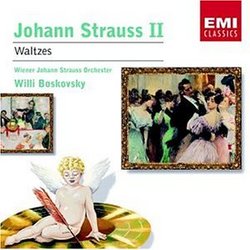Amazon.comThis is a delightful record and you don't have to be Viennese to enjoy it. These seven great, beloved waltzes are like a cornucopia of golden melodies; performed by musicians to whom the style is as natural as their native dialect, each seems more beautiful than the last. Boskovsky, founder of the Vienna Octet and Philharmonic Quartet, was concertmaster of the Vienna Philharmonic from 1939 to 1971 and took over the Johann Strauss Orchestra in 1969. His way with these waltzes is probably as "authentic" as one is likely to find. Those lilting rhythms sway and bounce, making the music dance right off the disc. However, compared to that of many other conductors, his approach is surprisingly straightforward. Though he takes time for elegant, poised transitions, the momentum is always maintained; only the introductions are free, flexible, and ruminative. He brings out the contrasts of mood, dynamics, and character, but the expressiveness never degenerates into sentimentality or exaggeration. The orchestra is very good; its sound is full but rather brassy, sometimes resembling a military band. Indeed, the instrumentation for these waltzes raises questions. It is thought that they were originally performed by a solo violinist (the composer), two violins, viola, and bass. Later, winds, piano and harmonium were added, and eventually they were scored for full orchestra. For an interesting comparison, listen to two other version: Alexander Schneider's, which duplicates the original five-piece group, but sounds a bit rough, and the Alban Berg Quartet's, with arrangements by Alexander Weinmann for two violins, viola and bass, and by Schoenberg, Berg and Webern for a group including bass, flute, clarinet, harmonium, and piano. The playing on the latter is fabulous: lilting, idiomatic, joyful, and intoxicating in sound. --Edith Eisler


 Track Listings (7) - Disc #1
Track Listings (7) - Disc #1